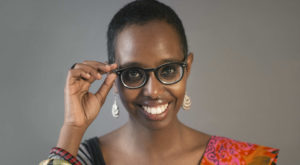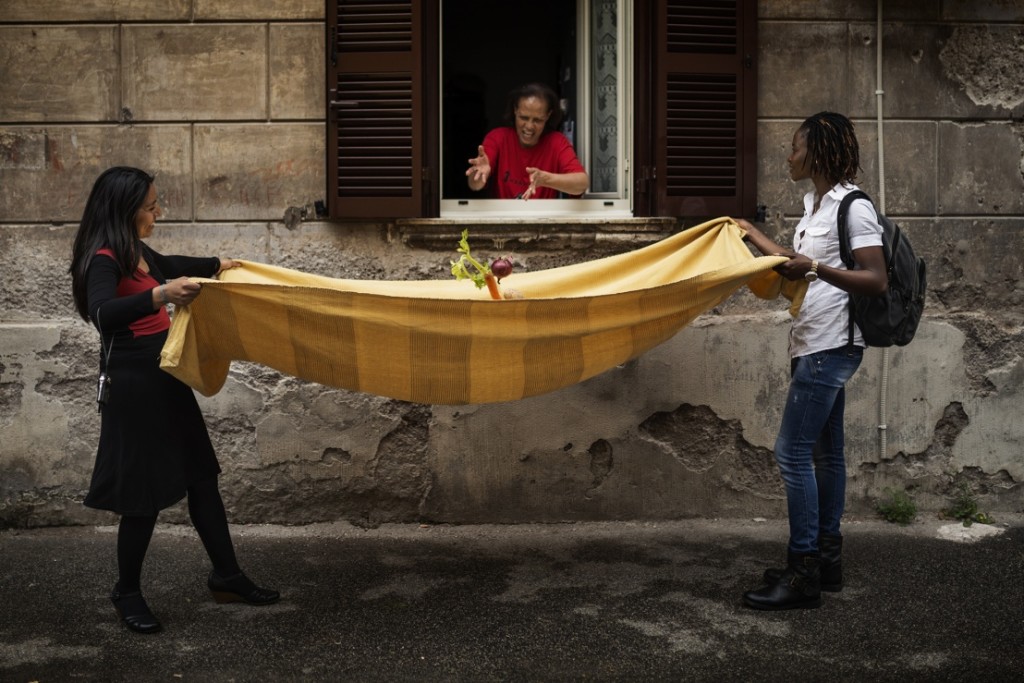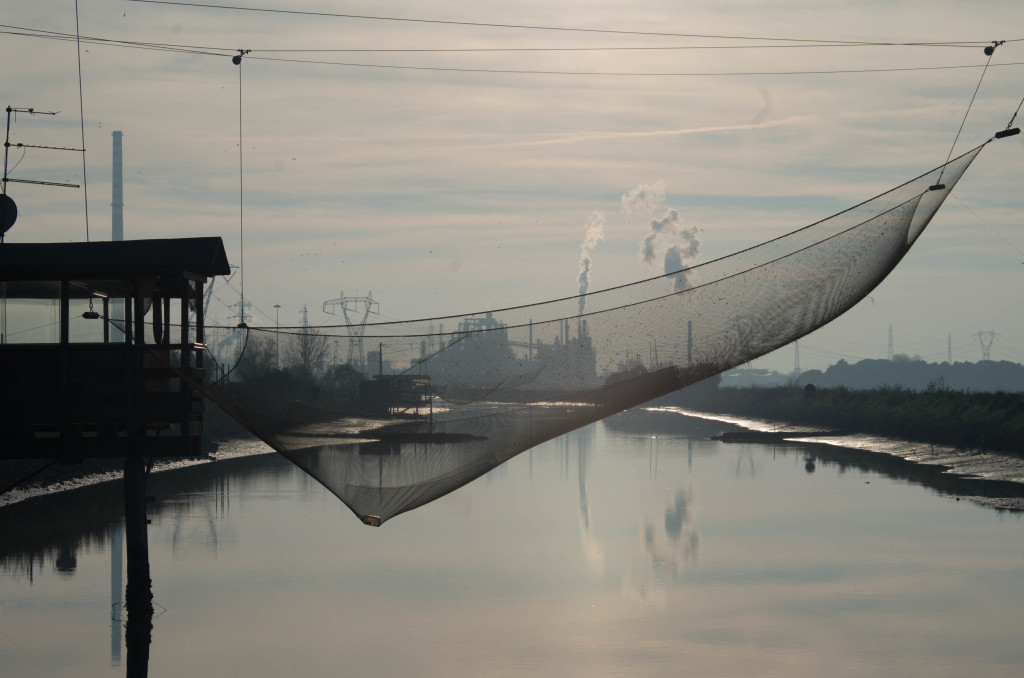From the novel Adua by Igiaba Scego, English translation by Jamie Richard, New Vessel Press, 2017, excerpted courtesy of New Vessel Press, holder of the copyright.
Excerpt from Chapter 7
[…] “Girls, this man is your father,” Papa said.
My sister, Malika, and I stood there staring at the man with the red beard. I noticed that he was bowlegged and had a devilish goatee.
And his back was curved like a pregnant woman’s. And also, why did Papa introduce him to us as our father?
I wanted to get rid of all of that angst.
“You have to shake his hand. He’s your father. Aren’t you happy?”
Malika and I were dying to ask, “Aren’t you our father?” But neither of us had the nerve. Maybe it was Papa’s look, the look of the man who up until that moment we’d considered our father, that dissuaded us. Maybe it was also the eagerness with which he pushed us toward that unfamiliar, lopsided man who inspired no confidence whatsoever. So we kept our mouths shut. As if a crocodile had caught our tongues.
We couldn’t even breathe. Or think. Around us, the bush howled fiercely like it did every night. I could hear the hyenas cackling and the fierce hunger of their obscene feasts. The crows cawed. The gorgor snored. The lions made love to lionesses worn out with exhaustion. A woman gave birth in pain. Malika and I stood there, barefoot, between two fathers. I didn’t like the new one at all. He was too old. Too hunched. He had twisted feet, rotten teeth, and the receding chin of a false virgin.
I looked at Papa with a silent plea for help. He broke eye contact and at that moment I realized he was rejecting me. “Tomorrow you will leave with him for the big city, for Magalo,” he said. Leave? For Magalo? Us? I had heard talk of the big city. Someone had told me that Malika and I were even born there. I didn’t want to go. I sensed that the big city would swallow all my purity, all my dreams. I was fine there with my goats, with my camels, and with that golden land that had become part of my bones. The land and I lived for each other. In harmony with the song of the elephants.
I was a nomad. I didn’t want to be rooted. I was a nomad. I wanted to be free to run in the wind. Malika was different from me. She didn’t have many wants, no. All she wanted was for people to love her. She was a person who only had to be given an order and she would follow it. Even the most atrocious order was for her the best possible solution. She refused to think, to decide. She didn’t want to be vulnerable. Let other people do that. Her attitude was, My life isn’t mine anyway.
So she bowed to this new father. She shook his hand. She signed the pact. She became his slave.
And so with that submissive gesture, she gained his eternal love. I was foaming with rage.
“I don’t want to,” I shouted. “I want Mama. I want to stay with my people.”
Papa told me: “Asha the Rash was your real mother and we aren’t your people. Your father, Zoppe, has asked for you. The woman who nursed you is one of my wives. Call her ‘god- aunt.’ You have different blood in your veins. You must learn this, you must learn it fast. We have been your caretakers.”
I didn’t want to learn it. I wanted to see the woman who to me would always be my mother. Mama was pretty. She smelled like jasmine.
“I want my mama.”
And that was when the bowlegged man broke into that absurd conversation. “Your mother died when she brought you into the world.”
“Yes,” my ex-father said. “She’s dead.” But I’d seen her just a few hours ago. “But I saw her …” I murmured. “That’s not your mother,” the new father yelled. “But …”
“No ‘buts,’ you brat. Learn to trust my words. I am the one who brought you into the world.”
I looked at my sister with contempt. She had already surrendered to the new order. I couldn’t bear such horror. I saw the old man, the one I would never call father, pick up a thorny branch. Then he pulled me toward him and gave me two lashes.
Two hard lashes. This was my baptism. The thorns stuck in my skin. I was like the Christian Jesus, a martyr for sins I hadn’t committed. I felt a deep sorrow well up from my unhappy gut.
“Mama, where are you?” I lamented. No one answered. My papa, the one who had been my papa, left the tukul. I heard his steps rapidly move into the distance. I thought I heard the echo of a sob. “Mama,” I called out. Then I fainted. When I came to, I had become an actress. No one would ever see my real face again.
Excerpt from Chapter 30
[…] Zoppe had to focus on that opaque, translucent voice. It was beautiful. A rugged singsong that could awaken a sleep-soothed soul to new life. But his words were harsh, sharp, horrible. Zoppe couldn’t stop to think about their meaning, because then he wouldn’t have translated any- thing. He would have been lost. A carcass that even a vul- ture would have left alone. The old man’s eyes dominated the dark. They stood out imperiously in that room that smelled of rats. But it was Count Anselmi’s cannibal gaze that confused Zoppe. His aristocratic grace was gone. The count’s Italian, once pleasant, had become a primordial scream. Even his once-elegant hands were the hoofs of a warthog in heat. In the middle of these people Zoppe felt alone. Traversed by the poisoned arrows of betrayal. Every word wounded him. Every gesture outraged him. The old man was offering Italy his support for the upcoming war. He would supply arms, men, refreshment, provisions. He promised to kill Emperor Haile Selassie himself, if necessary. The old man was signing a blood pact with Italy, from which there was no return. And he, Zoppe, was translating it. No, he couldn’t think about it. He had to open and close his mouth. That’s all. Open and close his mouth. Leave nothing out. Not even the sighs.
The count gladly accepted and promised the pathetic old man a grand career for his son. “You won’t have any- thing to fear with us.” And with that, he tossed a wad of Ethiopian talleros in the air, which the old man awk- wardly tried to grab. “Naturally, you’ll be compensated for your loyalty to Italy.” Another rainfall of talleros went through the room. The count laughed with satisfaction. It had been so easy to buy off those Negroes. Child’s play leading them to betray their own people. At that moment the old man yelled over to his son: “Thank the gentle count who has been so good to us.” The young man, who hadn’t moved a muscle throughout that entire discussion, began to awaken like a big golem dulled by time. In an instant he had thrown himself at the count’s feet and was kissing the muddy toes of his boots.

Igiaba Scego is an award winning Italian writer, journalist, and activist of Somali origin, born in Rome in 1974. Her parents were political refugees following a coup in their native country, where her father served as foreign minister. Her university training concentrated on Latin America and her latest book is devoted to Caetano Veloso. She has been a long time journalist, writing for important national newspapers such as Il Manifesto, L’Unità and Repubblica, as well as the weekly Internazionale, and other magazines such as Nigrizia. On the literary front, she focused initially on short stories (her story Salsicce” is considered a classic), the novel Adua is her third. In 2011 she won the prestigious Mondello prize, with her second novel “La mia casa è dove abito”.
Photo by Simona Filippini.
Jamie Richards is a translator based in Milan. She holds an MFA in Literary Translation from the University of Iowa and a PhD in Comparative Literature from the University of Oregon. Her translations include Igort’s Ukrainian and Russian Notebooks, Giovanni Orelli’s Walaschek’s Dream, and Jellyfish by Giancarlo Pastore.
Featured image: Photo by Marcello Scopelliti, from his photo reportage, accompanied by immigrant rights activist Cecilia Bartoli’s text, on the Torpignattara multicultural neighborhood of Rome, published in La macchina sognante n. 1




















































